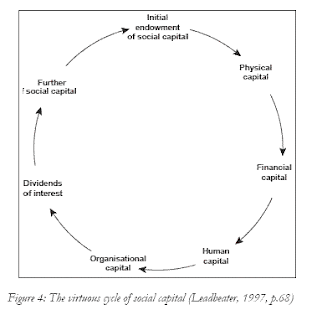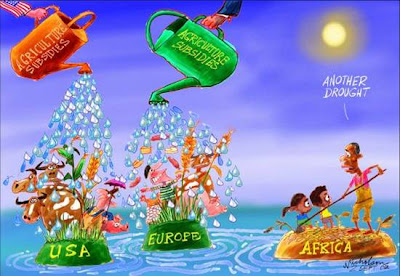Especially since Muhammad Yunus, founder of the Grameen Bank and a renowned example of a social enterprise, won the Nobel Peace Price in 2006 there is increasing interest in social entrepreneurship for development yet the current academic literature does not provide is a sufficient link between social entrepreneurship and economic development policies. How important are social entrepreneurs for economic development? What value is created by social entrepreneurship?
To answer these questions I researched the work of over 20 authors from Bornstein, Schumpeter, the OECD, the World Bank and many others for a paper for the UNSW. My findings conclude that the social entrepreneur sector is increasingly important for economic (and social) development because it creates social and economic values:
1. Employment DevelopmentThe first major economic value that social entrepreneurship creates is the most obvious one because it is shared with entrepreneurs and businesses alike: job and employment creation. Estimates ranges from one to seven percent of people employed in the social entrepreneurship sector. Secondly, social enterprises provide employment opportunities and job training to segments of society at an employment disadvantage (long-term unemployed, disabled, homeless, at-risk youth and gender-discriminated women). In the case of Grameen the economic situation of six million disadvantaged women micro-entrepreneurs were improved.
2. Innovation / New Goods and ServicesSocial enterprises develop and apply innovation important to social and economic development and develop new goods and services. Issues addressed include some of the biggest societal problems such as HIV, mental ill-health, illiteracy, crime and drug abuse which, importantly, are confronted in innovative ways. An example showing that these new approaches in some cases are transferable to the public sector is the Brazilian social entrepreneur Veronica Khosa, who developed a home-based care model for AIDS patients which later changed government health policy.
3. Social CapitalNext to economic capital one of the most important values created by social entrepreneurship is social capital (usually understood as “the resources which are linked to possession of a durable network of ... relationships of mutual acquaintance and recognition"). Examples are the success of the German and Japanese economies, which have their roots in long-term relationships and the ethics of cooperation, in both essential innovation and industrial development. The World Bank also sees social capital as critical for poverty alleviation and sustainable human and economic development. Investments in social capital can start a virtuous cycle (for more explanation see my PDF below):
 4. Equity Promotion
4. Equity PromotionSocial entrepreneurship fosters a more equitable society by addressing social issues and trying to achieve ongoing sustainable impact through their social mission rather than purely profit-maximization. In Yunus’s example, the Grameen Bank supports disadvantaged women. Another case is the American social entrepreneur J.B. Schramm who has helped thousands of low-income high-school students to get into tertiary education.
To sum up, social enterprises should be seen as a positive force, as change agents providing leading-edge innovation to unmet social needs. Social entrepreneurship is not a panacea because it works within the overall social and economic framework, but as it starts at the grassroots level it is often overlooked and deserves much more attention from academic theorists as well as policy makers. This is especially important in developing countries and welfare states facing increasing financial stress.
This is the executive summary from my 10 page PDF- read more:
'Is Social Entrepreneurship important for Economic Development Policies?'
 FINCA Peru Exports (FPX) is an interesting hybrid: It's a division of FINCA Peru, a pioneer in Microfinance for more than 10 years, and links microentrepreneurs producing handicrafts with Fair Trade distributors in Europe and North America. FPX has been established and run by young volunteers. Being part for a couple of months last year was a truly amazing and inspiring experience!
FINCA Peru Exports (FPX) is an interesting hybrid: It's a division of FINCA Peru, a pioneer in Microfinance for more than 10 years, and links microentrepreneurs producing handicrafts with Fair Trade distributors in Europe and North America. FPX has been established and run by young volunteers. Being part for a couple of months last year was a truly amazing and inspiring experience! Recently FPX published their two new catalogues with beautiful designs of handmade clothing, accessories, textiles and home goods from Peru. By buying from FPX you can directly help disprivileged women and families. Have a look at their two new catalogues.
Recently FPX published their two new catalogues with beautiful designs of handmade clothing, accessories, textiles and home goods from Peru. By buying from FPX you can directly help disprivileged women and families. Have a look at their two new catalogues.



